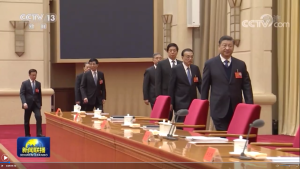“Economic work next year must have ‘stability’ as its watchword,” resolved China’s Central Economic Work Conference last week, according to summary notes released by Xinhua. The conference was held December 8-10 in Beijing and chaired by CCP General Secretary Xi Jinping.
The conference directed government departments at all levels to “take responsibility for stabilizing the macroeconomy.”
“All stakeholders should actively introduce policies that are conducive to economic stability, and policy efforts should be carried out appropriately,” the conference notes stated.
China’s economic growth has slowed over the past decade, with year-on-year GDP increases of 6.95, 6.75, and 5.95 percent in 2017, 2018 and 2019 respectively. The supply shocks of the pandemic and debt struggles of real estate giant Evergrande have also put a damper on growth.
In unusually candid terms, the notes to the Central Economic Work Conference stated that China confronts “serious pressures” in economic “strength,” “structure,” and “tempo.”
“Under the impact of the global pandemic… the external environment has become more complex, difficult, and uncertain,” the conference notes stated.
The Chinese Academy of Social Sciences predicted economic growth of 5.3 percent for 2022 in a research paper released December 6.
“The core problem right now is jobs,” said California-based independent journalist Wong Kim in a webcast. “The policy direction of the Central Economic Work Conference this time is all about strengthening employment.”
“Since the pandemic began, migrant worker numbers have shrunk by 4 million, but these are not included in the urban employment statistics. The employment circumstances of migrant workers are now very grim,” Kim explained.
“52 million work in construction and 80 million in manufacturing, both vulnerable sectors.”
Additionally, according to Kim, “The services sector has shrunk. In hospitality, it’s due to reduced consumer spending power. In tutoring services, it’s because the government shut them down. There are also big contractions in internet services companies.
“All of this is particularly bad for young people. In October, the unemployment rate of 15 to 24 year old workers was 14.6 percent, two percentage points higher than before the pandemic.”
The goals of the conference were circulated to relevant ministries, which issued policies for their implementation. On December 14 the People’s Bank of China released a statement committing to use monetary policy to advance the Central Economic Work Conference aims.
The Ministry of Finance is granting debt to cash-strapped local governments ahead of 2022 as stability-oriented stimulus. “A portion of 2022 credit will be issued ahead of schedule, and fiscal efforts will be deployed ahead of schedule to stabilize the economy,” reported Yicai, a financial news site. Yicai stated some experts predict 1 trillion renminbi of local government debt will be issued before the end of the year.
The National Development and Reform Commission issued a notice on “promoting the high-quality development of industry.” The notice was jointly issued with the Ministry of Industry and Information Technology.
On December 13, Premier Li Keqiang held a conference call with the president of the World Bank, David Malpass, and expressed China’s commitment as “the world’s largest developing country” to the Bank’s poverty alleviation aims. In the call, Li tied this to the Central Economic Work Conference aims.

































